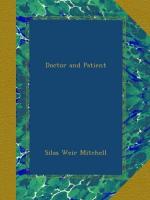I omitted above an allusion to the most unpleasant inquirers, those who are either on the verge of insanity or are victims of that singular malady, hypochrondriasis. A patient clearly staggering to and fro on the border line of sanity consults you. Here is a wilful, terrified being, eager to know the truth. “Am I becoming insane? Will I end in an asylum?” How can you answer? You see clearly, are sure the worst is coming. What shall you do with this morbid, scared, obstinate child-man? You put aside his questions, but you have here a person quite or nearly sane to-day, resolute to hear, afraid to learn the truth he dreads. I leave my reader with this patient, and my stated knowledge and my shifted responsibility. “Doctor, if I am going to be insane, I will kill myself.” Good reader, pray dispose of this case. Or take the ease of a confirmed hypochondriac. He is miserable, has a hundred ailments, watches the weather, studies the barometer, has queer delusions as to diets, clothes, and his own inability to walk. The least hint of a belief that he is not as well as he was a week ago, or even a too close examination, leaves him with a new malady, and he, too, is a sharp questioner. As a rule, he has no perceptible changes in his tissues. But if he has some real malady,—it may be a grave one on which he has built a larger sense of misery than there was need for, and the case is common enough,—how shall you answer him? It is a less difficult case than the other, and I gladly leave him also to my consultant reader’s acquired knowledge and to his personal sense of the value of truth.
Physicians are often blamed for not sooner warning a family of the fact that, in some case he and it are anxiously watching, death is inevitable. As to this the doctor has very mingled feelings. Sometimes he lacks courage, sometimes he is not sure enough to speak. A weak man fears that he will lose his patient and some quack be called in, and thus lessen the little chance yet left. Most of us can recall painful interviews in which a relative insisted on a definite opinion, which we were unable to give. As to cases where there is little or no doubt left, perfect frankness should be, and is, I think, our rule, but no one knows better, or as well as we, how numberless are the chances of escape for cases which seem to be at their worst. Hence a part of the reluctance the physician has to pronounce a verdict of fatal character.




